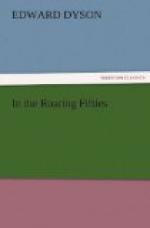large tent at night, and her guffaw overbore everything;
it was one of the wonders of Forest Creek. Many
a time its echoes, rebounding from Boulder Hill, had
set all Diamond Gully grinning in sympathy. It
was not known whether Mrs. Kyley and Ben were married
or merely mates, but popular opinion tended to the
latter belief, legal unions being incompatible with
a nice adjustment of forces at the rushes. The
exigencies of life on the diggings made sudden changes
of scene necessary to the men, and a woman like Mrs.
Kyley couldn’t be expected to abandon her business
for the sake of a husband, seeing that it was so much
easier to set up another husband than another establishment.
But the most important branch of the business, that
of sly grog-selling, made a man who could handle the
riotous and evil-disposed quite essential. Ben
Kyley’s appearance, broad, thickly-set, solid
as a gum-butt, broken-nosed and heavy-handed, and
his reputation as the man who was beaten by Bendigo
only after an hour’s hard fighting, marked him
as the fittest man on the field for the position he
held. For the rest, Ben was a quiet, mild man,
whose voice was seldom heard, and whose subjugation
to Mrs. Ben was almost comical. Ben worked on
his claim by day, and at night he officiated as ‘chucker-out’
in Mrs. Kyley’s bar—for a bar it
was, to all intents and purposes. Ben’s
duty was not to suppress disorder, but merely to see
that the common disorder did not develop into licentiousness,
to the danger of Mrs. Kyley’s property or the
detriment of her trade.
Mrs. Ben Kyley made bread because bread-baking at
three shillings a loaf was an exceedingly profitable
business. For the same reason she washed shirts
at twelve shillings the half-dozen. But selling
rum at a shilling a nobbler to ‘flash’
diggers who despised change was much more profitable
still. The industrious woman, who washed and baked
all day, was kept busy for the greater part of the
night retailing rum to insatiable diggers, and the
mystery was that, although nobody could see rum in
the bottle or in bulk anywhere about the place, it
was rare that the supply ran short.
Jim had visited the tent on one or two occasions,
walking from the other side of the gully; he went
again on the Saturday afternoon following their removal
to buy bread. Mrs. Kyley’s big camp-ovens
were nestled in the fires outside the tent, three
of them in a row; Mrs. Kyley herself, half smothered
in suds, was washing with the rapidity and the indefatigability
of a machine.
‘Aurora will attend to you, my boy,’ blared
Mrs. Kyley, blowing a storm of suds out of her mop
of hair.
Aurora! Jim entered the tent wondering, and found
three or four men at the counter, conversing with
a young woman, twenty-three perhaps, tall, black-haired,
dark-eyed, flushed with colour, happy in temperament,
free in manner, a striking representative of a not
uncommon type of the time, meeting men on a mutual
footing, asking no concessions and making none—Jim’s
‘Spaniard’ of the Melbourne dance saloon.
She recognised him immediately.




